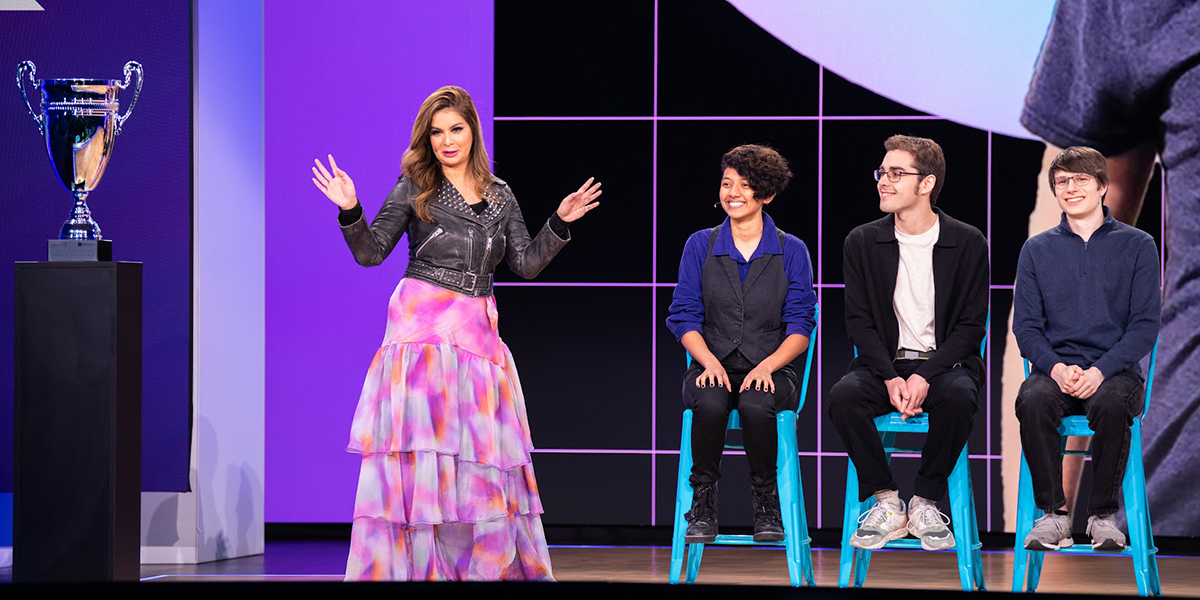Student finalists in Microsoft Imagine Cup ready to take ADHD app to next level
Roadmap uses artificial intelligence to learn the best way to keep people on track

Being finalists in the Microsoft Imagine Cup competition certainly has its perks.
As one of three teams that converged in Seattle last month, the three students who created Roadmap — an app to help those with attention deficit hyperactivity disorder (ADHD) — got the red-carpet treatment that included a fancy hotel and some amazing meals.
More importantly, though, they made connections that could take their idea to the next level and get it into the hands of users worldwide.
Clay Battle and Ever Goldin, who will be seniors at Binghamton University this fall, met co-founder and Georgia Tech student Aaliya Jakir in their first year at the Thomas J. Watson College of Engineering and Applied Science’s Department of Computer Science.
They collaborated on a HackBU hackathon project before Jakir transferred to Georgia Tech and then continued to work together on Roadmap, an AI coach that creates personalized advice for users to keep themselves on track.
At the Imagine Cup finals, which celebrates students who build startups with artificial intelligence at their core, the Roadmap trio competed against two teams from the U.K. and Turkey.
Although they didn’t win the top prize, the two runners-up each received $50,000 to fund further development of their ideas. They also met with top managers from Microsoft Corp., including the chief accessibility officer, as well as other prominent companies and venture capital firms who loved their ADHD aid.
Roadmap utilizes Microsoft’s Azure OpenAI Service to power their AI ADHD coach. At the beginning, the coach asks the user what task they need help starting. As the conversation progresses, Roadmap helps to break down the task into manageable steps and collaborates with the user to find the best strategy to get the user started. Is it better to have music in the background or silence? Are planners an effective way to track what needs to be done? Do deadlines offer enough motivation, or is something else needed?
Just being selected as one of three finalists — out of 20 semifinalists chosen among hundreds of entries from more than 50 countries — seemed like a dream come true for the Roadmap team.
“It was awesome,” Goldin said. “We didn’t get to see all the semifinalists present, but we were in a group of six and got to see those. They were all incredible startups — so well thought-out and well executed that it felt amazing to be part of that group.”
Battle believes that two key points set them apart from other semifinalists. One is the potential user base that could benefit from Roadmap. ADHD affects around 5% of children and 2.5% of adults worldwide. Hundreds of millions of people deal with cognitive symptoms such as an inability to make decisions, inattention, impulsiveness and inappropriate emotional reactions.
“Microsoft highly values accessibility, but a lot of companies think ‘accessibility’ means physical disabilities like vision or hearing loss, or amputees and other things like that,” Battle said. “We’re doing accessibility for different brain types, and that resonated with not only what Microsoft values but also with the competition’s focus on accessibility.”
It also helped, he added, that Roadmap is a business-focused startup that has been part of accelerator programs through the Koffman Southern Tier Incubator and Georgia Tech’s CREATE-X Startup Launch: “A lot of student startups are very tech focused, building out the world’s most perfect-looking product, but there’s no business demand for it. Fifty percent of the judging criteria for the Imagine Cup is business viability.”
The Imagine Cup prize money and other funding mean that Goldin and Jakir can work full time on Roadmap this summer. In addition to software upgrades, they want to develop their network of ADHD coaches who can interest their clients in using the app.
Going to the Microsoft event offered the Roadmap team a lot of encouragement as they take the idea to a wider market.
“Attendees at the conference would come up to us and say, ‘I love what you’re doing — please keep doing it. I have ADHD, and your product and your messaging resonates with me,’” Battle said. “It was an overwhelming sense that what we’re doing is important.”
